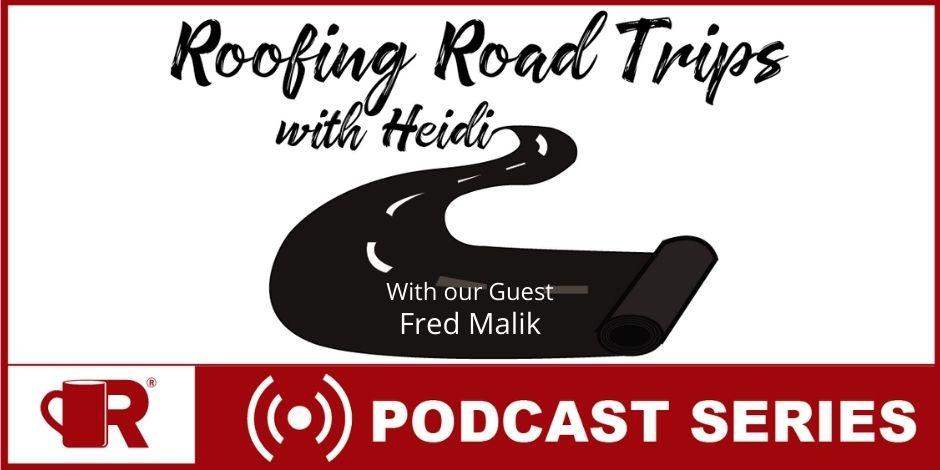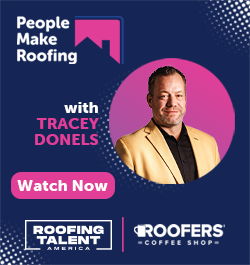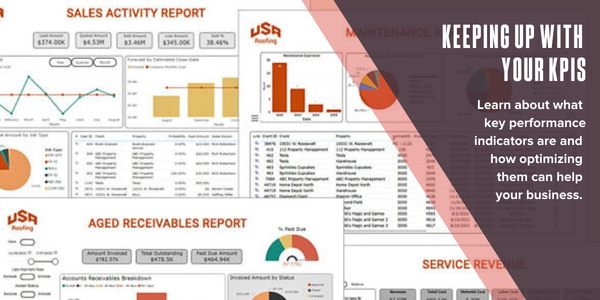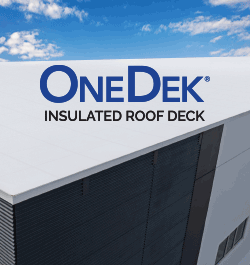S2:E46 Roofing Road Trips -Fred Malik- PODCAST TRANSCRIPTION

Editor's note: The following is the transcript of an interview with Fred Malik, of Fortified. You can read the interview below or listen to the podcast here.
Speaker 1: Welcome to Roofing Road Trips with Heidi. Explore the roofing industry through the eyes of a long-term professional within the trade. Listen for insights, interviews, and exciting news in the roofing industry today.
Heidi Ellsworth: Hello, and welcome to another episode of Roofing Road Trips with Heidi. I am here today with Fred Malick of FORTIFIED, which is part of IBHS, which is as many of you know, is really the [inaudible 00:00:33] on testing and working with insurance companies and with contractors. It all comes together in FORTIFIED. So Fred's going to be talking about that with us today. Welcome to the show, Fred.
Fred Malik: Hey, thanks Heidi. I appreciate it.
Heidi Ellsworth: We are very excited to have you here today. Tell us about this important program that is just doing so much for homeowners and contractors around the country. Why don't you kind of start out, tell us a little bit about yourself and how you got involved in roofing and then the FORTIFIED program.
Fred Malik: Sure, sure. Happy to. Well, it just so happens that today is my 11th anniversary with IBHS. So I've been working with the FORTIFIED program now for 11 years. But prior to thatHeidi Ellsworth: Wow.
Fred Malik: Yeah, it's flown by. Prior to that, I was a builder, and I started my home building career in the MidAtlantic States working for the seventh largest home builder in the United States. Worked there for geez, over 15 years. During that time, my family had a home down in the Florida Keys, and we actually were in the Keys the night before Hurricane Andrew hit.
Heidi Ellsworth: Oh my.
Fred Malik: We had some family members that lived in the Miami area and we evacuated the Keys, flew out of Miami the morning of, and my family was on the first plane back into Miami after Hurricane Andrew had passed. Everything was leveled. Everything was flat. Homes that wiped out. That was my first real experience with severe weather and hurricanes, and as a builder, I had to ask myself, well, geez, "Am I doing all the right stuff?" Because we don't get this kind of weather in the Mid-Atlantic. And that was scary.
Fred Malik: Then in 2006, I moved to Florida, which was right after a super intense 2005 hurricane season where it had three major land falling hurricanes in Florida. And that was an eye-opening experience, just seeing the different ways that that severe weather could attack houses and the differences in performance among houses that paid attention to critical details and those that didn't have that same level of protection. That really got me interested, and that was my first connection to IBHS was as a builder. Then an opportunity came around to help grow the FORTIFIED program. I just thought it was an opportunity I couldn't pass up, and so I've been here now 11 years.
Heidi Ellsworth: Wow. That's impressive. When I started in the roofing industry, it was right during Hurricane Andrew too. I was working with Malarkey, who was sending shingles into Dade County. So it does really humble you when you see the effects of what's going on. So tell us a little bit about the FORTIFIED program and its connection to IBHS. Tell us just a little bit more about that and how that all works.
Fred Malik: Yeah, sure. Continuing on that theme there, one of the things that immediately jumps out to people if you're really looking at how houses are performing in severe weather is the very first line of defense is that roof system. It's exposed 24 hours a day, 365 days a year. It is really the key to keeping a home from experiencing catastrophic damage. That in and of itself was, as we were developing the FORTIFIED program, we are all about figuring out what are the sources of avoidable loss and financial loss, the suffering that comes along with severe weather, and investigating the roof and finding strategies and solutions to improve the performance of roofs is right at the top of the list.
Fred Malik: That's really where I started to get intensely into roof-related issues. A little bit about IBHS for your listeners who may or may not know, but IBHS stands for the Insurance Institute for Business and Home Safety. We're similar to IIHS. They crash test cars. We literally crash test houses. We have a world-class unique research center in South Carolina, where we have a massive wind tunnel. 105 fans. We can create category three winds, realistic hail, wildfires, and generate as much as eight inches of wind-driven rain per hour. That really gives us a unique capability to understand how houses and the systems that make up a house perform and where are their vulnerabilities. At its founding back in 1978, IBHS has always been a research organization. We're a nonprofit. We really exist to develop good information, good strategies for producing resilient homes, and then getting that out where people can use it.
Fred Malik: If we do research like we can, and we just put it in a whole bunch of academic papers and a small universe of people reads it, that's all good, but really it doesn't necessarily move the needle and improve people's lives. I get the good fortune of being able to be one of those people that takes all that great stuff that we develop in that wonderful research center and translate that into something that people can do something with. That's really what FORTIFIED is.
Fred Malik: Back in 1978, the Institute was founded. We communicated, we did a lot of post damage research. We came up with our first FORTIFIED standard not too long after that. It was only for new construction, and it was really well beyond the building codes at the time. About 11 years ago, we took another look at it and said, "We're missing a huge opportunity here. There's millions of homes and millions of roofs and inventory across the United States. They're all vulnerable. What can we do about that?" We went back and relooked at FORTIFIED and we came up with the current iteration of FORTIFIED [inaudible 00:06:56], FORTIFIED Home. In FORTIFIED Home, we have three levels of designation: roof, silver, and gold. But every house, no matter where it's located in the United States ... And now there's more than 20,000 of them across the United States ... Every home has a FORTIFIED roof, no matter what level, because that's how important we see the roof system and roofing in general.
Fred Malik: We look at things like wind, it's effect on the material, what's the supply chain do to the material, how important is installation? Last year, IBHS developed and released a unique impact rating test protocol that really delivers real world predictability about how shingles will perform. So when we do something like that, we come up with something like that, that's new and innovative, we bring that into FORTIFIED and that's how we get it out to the building community.
Heidi Ellsworth: That makes sense. Yeah. I've been in your facility before and seen the testing and see what you do to those poor homes and yeah, it's impressive. I love the fact that you bring it out. You're right. It's not just academic. You're really putting it all together and delivering it to builders and to everyone who's trying to put together a resilient home.
Fred Malik: Yeah. To be honest with you, it's generally my position, having come from the building trades, we want to do good work. We know that we provide a valuable service to people. Lots of times people rely on us to be technical experts in our particular trade, whether it's roofing or general contracting. By and large, the majority of folks that I interact with really want to do a good job. They take that responsibility seriously.
Fred Malik: One of the things I like about working in FORTIFIED and with IBHS is that we're a voluntary standard. We have the good fortune of ... I don't have to sell our product to anybody. I can make the information that we have available to people so that they can use it with their customers. They can provide excellent customer service. They can become experts in this space. They can deliver higher value. That's what I get the luxury of being able to do through FORTIFIED. I really hope that that comes across to folks that this is something that you can use in your business to make yourself more appealing to potential customers and to set yourself apart from folks that are just putting on standard roofs.
Heidi Ellsworth: Right. Right. I think that's really the key too, is what you're talking about is that differentiation for the contractors and really having this program behind them. So talk a little bit about how that, kind of get a little bit deeper into that for the roofing contractors on exactly what the FORTIFIED program can do for their business.
Fred Malik: Sure, sure. Well, let me pick up too that really it's not terribly complicated. I want to get that across too that while we spend an awful lot of time and money in figuring out and understanding how the roofsystem performs and where we can do better, at the end of the day the things that need to be done aren't terribly complicated. Fred Malik: So it can be boiled down into three things: nail it down, seal it up, lock it in. Talking about those things. So nail it down. We're just talking about making sure that the substrate that the roof cover's going to be installed over is in good shape, and that it's attached in a way that it's going to resist the winds and the rain that it's likely to see.
Fred Malik: Sealing it up is a concept that has been relatively unique to FORTIFIED for a number of years. We call it the sealed roof deck. That's where we combine a couple of different types of materials to produce a really durable underlayment. That underlayment is then is capable of staying in place, even if the roof cover fails. If the roof cover fails, we're still keeping the water out, and that's another important thing here. Sometimes when I'm talking to roofers, roofers are worried that, "Hey, if I build nothing but FORTIFIED roofs, I'm working myself out of a job. I'm not going to have a whole lot of replacement opportunities." That's really not the case. FORTIFIED doesn't necessarily make something indestructible. We anticipate that there will be some damage particularly to the cover, but what we want to try and do is stop the damage there and not let it amplify because once the water gets into the house, that's when real suffering and financial loss starts for the homeowner. If we can keep the damage to the outside, we can repair roofs all day long, but keeping that water out is the key.
Fred Malik: So once you seal the roof deck, then the next most important thing really is to pay attention to how that roof is installed around the perimeter at the edges. There's a phenomenon that happens that we've learned throughout our testing and through collaboration with others that the pressure that gets exerted on a roof by high winds is its highest at those edges. So that's along the eave, up the rake and at the ridge. That's where the pressures are the highest and where the cover is the most vulnerable. So if you could pay attention to a few details there using a drip edge, making sure that metal drip edge is attached well, making sure that you're using a starter strip, a manufacturer's compliance starter strip, if you're doing a shingle roof, following the tested assembly for metal roofs or tile. If you're paying attention at the edges, you can really take a big step forward, make sure that that roof is going to be resilient.
Fred Malik: Those are the simple things that can be done to make a roof more durable. But you asked about, "How does a contractor use this stuff?" Now that we've sort of explained what's required, there's a couple different ways that contractors can use our stuff. One is we have some training. I'm sure we'll talk about it a little bit. We have a virtual training university that we launched just a couple of months ago. It's called FORTIFIED Wise University. It's available at fortifiedwise.com. Roofers can go there. They can register for training. The training takes less than five minutes to register for. You select a course. If you're on the coast, you're going to select the hurricane course. If you're anywhere away from the coast, you're going to select our high wind and hail course. The course is self-paced. It's 10 modules, 10, 11 modules. Takes about two-and-a-half hours to complete.
Fred Malik: If you decide that you want to become a FORTIFIED Wise roofer and listed in our directory, you take an exam at the completion of the course. If you pass the exam, you get listed, and that becomes a lead generator and a referral generator. So that's the first way that you can benefit as a roofing contractor. The course itself is relatively inexpensive for two-and-a-half hours of really expert training. It's $100 for the course and $50 for the exam.
Fred Malik: Like I said before, we're not in a position where we're trying to generate a ton of revenue out of this. We're really trying to make this as accessible to people as possible. The training is relatively cheap. Once you become a FORTIFIED Wise roofer, a whole host of other things become available to you. On our website, which is fortifiedhome.org, we have a whole suite of marketing collateral that FORTIFIED Wise roofers can use. That's yard signs, it's magnets for your truck, it's sales brochures, it's one-pagers that explain the process so that you and your sales team don't have to figure out how to sell it.
Fred Malik: You can take some of our collateral and include in your sales folders so that people understand what it is you're offering. So there's a whole host of those things. Plus, once you begin participating in the program, you do have access to my team that are experts in construction and particularly roofing. So if you have questions, we can a lot of times help you answer those questions or connect you with a manufacturer that can walk you through their installation and really make you an expert in your field.
Heidi Ellsworth: That's great, because what I really like too, is what you're talking about ... Be able to educate and train the sales team on how to sell it, have the marketing tools there that they can use to really do it. That just differentiates the business for the roofing contractor that they're certified, and they have this to offer, the FORTIFIED program. So talk to me a little bit about and share a little bit about that training. So I know through the course, who do you recommend to take it? Is it for everybody, the owner, the salespeople, the crews? Kind of talk through that a little bit.
Fred Malik: Coming from a contracting background and many of my staff, my teammates actually, come from a contracting background. We know how hard it is to win business. We want to try and set people up for success and help them win at the kitchen table. For a period of time in my career, I was on commission and selling new homes. I know how important it is to be able to quickly make your case and get a job closed so you can book it. We try to make sure that we have materials available to make that easier. But when it comes to the training, we designed the training in such a way that the course itself is really appropriate for anybody who works in your office. Project managers, sales team, owners, even the folks that are handling some of the administrative duties and have to coordinate some of the delivery of materials and the like, everybody in your office can benefit from the training because you know that then they all are speaking the same language.
Fred Malik: They know what's involved in delivering a FORTIFIED roof once one is sold. That training really is done in such a way that while you'll get more out of it, the more technically knowledgeable you are, you can see the different ways you can apply it, but anybody that's in your office can really benefit from learning about it.
Fred Malik: The first three modules are primarily dedicated to explaining the process, the science behind it, and understanding how you're going to work with the third party evaluator that's required, third-party verifier who's required. So those three modules by themselves are really good for the office staff in particular. By the way, I failed to mention this, but anybody who's interested, if you go to the fortifiedwise.com and you register, you can view the first module for free.
Fred Malik: So at the very least, everybody in your office should go look at that free module, because it does give some good basic information about the program, and it doesn't cost you anything. If you see value from there, then you can sign up other folks to actually complete the training.
Fred Malik: The second batch, the second suite of modules that's in there, modules four through 10, that gets into the more technical elements of making sure that the substrate's good, making sure it's nailed down right, sealing the roof deck, taking care of the edge details. We do go into a fair amount of detail as well into specific covers. So shingles, metal, tile, and low slope roofs.
Fred Malik: We're not going to make you a fully competent roofer. We assume that many of the people that are coming in have experience roofing. So if you don't have experience in the trade at all, some of these modules would be new to you, the concepts in these would be new to you. But for those who have experience installing those systems, then you get to really expand your knowledge on how to read things like, or determine things like design pressure ratings, which are critical for systems like metal roofs and tile. Understanding the importance of material and selecting material that is complementary to one another. In other words, stuff that can be used together and is compatible.
Fred Malik: A lot of times we see folks in the field that are putting materials on together that individually the materials were okay, maybe even very good, but put together they can actually be uncompatible or incompatible, and that can lead to premature deterioration of the roof and a lack of longevity. So we talk a little bit about the importance of paying attention to those details. So anyway, those are some of the things that I think are benefits to the training and some of the things that are involved.
Fred Malik: We also talk a fair amount about documentation. We're terribly sensitive to the importance of schedule. We get that profitability is tied to how quickly you get on the roof, how quickly you get off the roof. We understand that introducing another level of inspection or another level of oversight into a project can be intimidating for somebody and can be a cause for concern that, "This is going to delay my job. It's going to hurt my profitability."
Fred Malik: So what we try to do is build up your knowledge as a roofer into what we are going to require from a documentation perspective. That way, when you work with the evaluator, you guys can work together to time visits according to your schedule, and where an evaluator may not be able to be on the job atexactly the time something is happening, your crew can document that. They can take pictures, they can fill out the appropriate forms, and then they can share that with the evaluator. The evaluator is required to be on the job at least twice during a roof installation. But at the end of the day, we don't want to disrupt that schedule, and your crews can help with that the more knowledgeable they are.
Heidi Ellsworth: Wow. To follow up on that, the evaluators, where are they? All over the country? How does that work?
Fred Malik: So that's a great question. So we're continuing to build our network. We have higher concentrations in a few states. Alabama, Mississippi, North Carolina. We've been there the longest and we've got a good network there. We're building a national network. We've partnered with a national firm. That firm is called Pilot. That firm gives us the ability to bring on board inspectors wherever they may be needed. We're starting to phase that in and roll that out. So really FORTIFIED can be done anywhere in the country, but there are more options from an evaluator perspective in some of those markets that we've been in longer.
Heidi Ellsworth: That's really cool. I worked with Pilot when I was at EagleView. Great company. Great company. That's a really great partnership. That's fun to hear. We'll have to explore that a little bit more on Roofer's Coffee Shop too and talk about that because the whole evaluator thing, I think, it just comes down to creating those relationships. I love how flexible you are because we know how important it is to get the jobs done, not just to stay on schedule for the roofing contractors, but for the homeowners too. They want it. They kind of want to get it going and get her done. I know you mentioned the amount of time, you said it takes about two-and-a-half hours to go through all those modules. Do they have to do something with that evaluator afterwards? Or does it just go right to the first job then?
Fred Malik: Yeah, you can go right to the first job. Obviously like anything, the more you do it, the easier it becomes, the more efficient you become at it. So the first couple of jobs, there's a fairly steep learning curve, but like I said, we're not talking about major retraining that has to be done with your workforce.
Fred Malik: It really comes down to certain product selections that need to be made so that you can put together the right combination of products to achieve the things that are required like the sealed roof deck. But, in hurricane-prone areas, we're nailing the roof deck off at four inches on center with ring shank nails. That's pretty straightforward. There's not a lot of complication to that.
Fred Malik: When it comes to sealed roof deck, one of the more popular options happens to be using a qualified tape on all of the roof deck seams. Then once all the seams are covered with that tape, installing a durable underlayment, either a 30-pound felt or a synthetic underlayment. Securing that with button cap nails according to the manufacturer's high wind installation guide will meet the FORTIFIED requirements, as opposed to just hand tacking. Hand tacking is great if you're going to immediatelycover it and you expect that roof cover to never come off. But as soon as that roof cover comes off, the underlayment goes with it. So button cap nails are really the key.
Fred Malik: And then, things like installing a metal drip edge. We require that in hurricane areas to be nailed off at four inches on center. That keeps that edge locked down. And then selecting an appropriately rated roof cover is the last thing there. We're not talking about significant retraining necessarily. What we are talking about making informed decisions and intentionally putting things together so that durability gets achieved.
Fred Malik: That's the other place I think that really is an opportunity for folks. When your sales team is talking to folks, you can offer now a really a good, better, best scenario, and you can leverage what we do. In our research center, we film everything that we do pretty much. We do some really impressive full-scale demonstrations. We usually do one or two a year that are really good at telling the story very quickly about why these things are important. FORTIFIED Wise roofing contractors get to use that video content. They get to use those images to help tell the story. The other thing is the industry that I work for that pays the dues is the property insurance industry. They've invested over $40 million in this research center.
Heidi Ellsworth: Wow.
Fred Malik: As a roofing contractor who's participating, you get to leverage all of that. You haven't invested that kind of money. You've invested $100 potentially in becoming a FORTIFIED Wise roofer, but you've got $40 million worth of investment behind you. Being able to share that with your clients and say, "Here's what I can do for you. I can put on a good performing standard roof, or I can offer you a FORTIFIED roof. And here's what makes a FORTIFIED roof different. And here's why I offer this." That's a pretty powerful thing at the table, because we know that that homeowners rely pretty heavily on roofers. They're considered a trusted resource because it's a technical job, and roofers have a lot of influence over their clients. So when you have the ability to paint a picture and say, "Here's what I can offer to you," nine times out of 10, that homeowner's going to give that option a consideration because that's something that not everybody in your market is going to be offering.
Heidi Ellsworth: Yeah, no, I think that's great. I agree. And especially when you think about the great video that you have that shows what works and what doesn't work. Right now, working with the social distance and doing a lot more remote selling, this gives a real opportunity to show how this is going to protect their home. Right now, home is more important than anything. I just don't think there's ever been a moment where the sanctity of the home has been so high with what's going on with COVID. So having a strong fortified roof, really that's a great selling point for contractors and a great with all the video and the content that you have for them. I love it.
Heidi Ellsworth:One last question, and then we need to probably wrap up on this Road Trip, but I know now you've mentioned a number of times the manufacturers who are involved. So can contractors find those manufacturers on your site? Is that an understanding on the different testing?
Fred Malik: So we're continuing to build relationships with manufacturers across the board. In terms of the impact rating that we released, yes, we actually have a rating on our website that lists the manufacturers, their product, and the ratings that that product earned. To qualify for a FORTIFIED home high wind and hail designation, you have to use a product that is rated either good or excellent on that list. We have all the manufacturers there. They knew about our testing. They were brought in when we were developing the testing.
Fred Malik: The folks that are there have really responded well to that. We've seen changes in the market already as a result of that testing. In other cases, just about any manufacturer has a good product that can be selected that meets the wind requirements, but what you really want to look for is a manufacturer that, particularly on things like metal and tile, that has testing that's been done to establish what the design pressures are for for that material. Make sure that when you're talking to your distributors or going through your roofing supplier, talking to your manufacturers, you ask them what kind of testing they have and get that in hand because that'll really help make the process easier.
Fred Malik: One thing I failed to mention, I would be remiss if I did not. I mentioned four states earlier. Alabama, Mississippi, Oklahoma, and North Carolina. In those states, there are actually financial incentives for FORTIFIED roofs. If you install a FORTIFIED roof, your client is now eligible to get a substantial reduction in their property insurance. It can amount to a couple of thousand dollars each and every year that that certificate is in place. That is something that roofers need to know that you have the ability to give your client access to that kind of financial savings, which makes it more affordable to live in those places. I should've told you about that earlier, but I'm glad we got it in there.
Heidi Ellsworth: Hey, I think that's a great note to end on. That is awesome. What I would say, kind of to wrap this up, what I would recommend to every roofing contractor who's listening to this is that they get onto your site, they look at the program, see who the manufacturers are, then talk to their manufacturers and talk to your distributors and kind of see how this is working, because this is another way to differentiate and really provide a product that has a lot of power behind it when you look at everything that IBHS and all of the companies involved with IBHS are doing. I also recommend look on Roofers Coffee Shop. FORTIFIED is on here. We have that information in the directory. We're writing articles. We're doing this podcast because we really want to get this education and opportunity out to all roofing contractors across the country. Fred, thank you so much for being here today.
Fred Malik: Thank you, Heidi. It was really a pleasure to be here. We appreciate all that the Roofers Coffee Shop does, and we look forward to seeing your listeners coming through the program.
Heidi Ellsworth: Yes, we do too. Thank you so much. Thank you everybody for listening today on this Roofing Road Trip with Heidi, talking about the FORTIFIED program and listen to all of our podcasts under our Read, Listen, Watch section of the rooferscoffeeshop.com. Thank you so much for being here today, and have a great day.
Speaker 1: Make sure to subscribe to our channel and leave a review. Thanks for listening. This has been Roofing Road Trips with Heidi from the rooferscoffeeshop.com.






















Comments
Leave a Reply
Have an account? Login to leave a comment!
Sign In